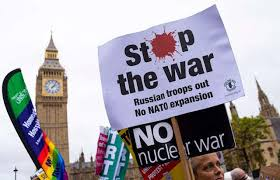
Posts Tagged ‘paz’
Maximum tension between NATO and Russia
Accusations of direct aggression between the West and Russia have reached a dangerous limit.
The tensions surrounding the war in Eastern Europe have reached an all-time high. British Prime Minister Keir Starmer and US President Joe Biden are reportedly talking about allowing Kiev to use American ATACMS and British Storm Shadow long-range missiles on internal Russian targets.
On the other hand, China and Russia have held joint military exercises called “Joint SEa-2024”, which Japan and Eastern countries view with suspicion, as well as Taiwan and the islands that are conflicts between Japan and Russia (Sakhalin and Kuril Islands) and China and the Philippines (Spratlye Islands and Scarborough Atoll), but the main conflict is markets with the West.
Russia has used drones from Iran in the confrontation with Ukraine, and this strengthens the link with the Muslim world, while support for Israel from France and the US strengthens the NATO alliance.
Brazil and China had proposed a peace proposal that would “freeze the current borders” in a ceasefire, but this referred to May, now the advance of the Ukrainians into Russian territory changes this scenario, and it is not clear what the proposal actually is, but Ukrainian President Zelensky had already rejected the proposal, saying he was not consulted.
The scenario is serious because a simple attack on Russian territory with long-range missiles will be considered a NATO aggression, since Western countries have offered weapons and given a go-ahead, while NATO forces are preparing a possible retaliation.
On the Middle East front, as I explained with almost the same allies and enemies, the climate is also one of hostility and an agreement seems to be further and further away.
A senior Hamas commander, Oussama Hamdane, in an interview with AFP accused the United States of not exerting enough pressure on Israel to seek a ceasefire agreement, and claims that on the contrary “it is trying to justify the Israeli side’s evasion of any compromise”, and American political strength would be able to lead the Middle East to a hope of peace in a conflict that has gone beyond humanitarian limits.
There are still hopes, voices calling for serenity and common sense, various organizations and entities that are honestly seeking a reasonable and lasting peace.
Asymmetries, power and sociability
The Korean-German essayist Byung-Chul Han,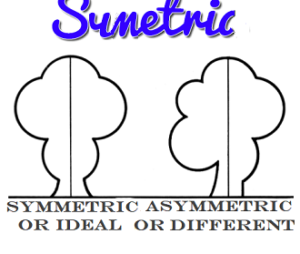 in his book In the Swarm, points out that only respect is symmetrical, the various forms of communication and power are asymmetrical, but this taken to the limit causes hatred, contempt and war.
in his book In the Swarm, points out that only respect is symmetrical, the various forms of communication and power are asymmetrical, but this taken to the limit causes hatred, contempt and war.
Jacques Rancière, who wrote “Hatred of democracy”, points out that this theme has taken on dramatic contours today, but already exists in literature: “The author points out that rejection of democracy is nothing new, but it has new contours:
Its spokespeople inhabit all the countries that declare themselves not only democratic states, but democracy tout court. None of them claim a more real democracy. On the contrary, they all say that it is already too real. None complain about the institutions that claim to embody the power of the people, nor do they propose measures to restrict that power.
Rereading the literature, he recalls authors who defended it: “The mechanics of the institutions that enchanted the contemporaries of Montesquieu, Madison and Tocqueville do not interest them. They complained about the people and their customs, not the institutions of their power. For them, democracy is not a corrupted form of government, but a crisis of civilization that affects society and the state through it,” and so we don’t speak of a ‘crisis of civilization’ at random.
The discussion of the media influencing politics has been around for centuries, as has the fact that defaming opponents through situations that are not always true or even out of context is a common practice to try to impose an opinion in an asymmetrical way.
The fact is that we now have a more powerful medium that can potentiate these falsehoods and the new media are not just control algorithms or efficient Artificial Intelligence mechanisms, now a new technological approach, the fact is that we have to seek a balance, a symmetry from personal relationships to power.
You can’t apply laws unilaterally, or even make them to suit political situations, they must apply to everyone and if they change they must follow a rite and the appropriate institutions for this, trampling on powers, anticipating processes or making summary rites are abuses of power.
This is how we start with respect for opinion, for dialogue, for what is different, and arrive at the exercise of power with moderation and the utmost fairness, even if opposing forces confront the contradictory discourse, this must be done within the framework of legality and legitimacy.
On a personal level, overcoming stalemates, raids and personal differences with parsimony and respect helps to balance social relations, even if it often borders on offense on one side.
It’s not a heroic attitude, it’s a defense of coexistence, tolerance and social peace.
Rancieré, J. (2007). Hatred of Democracy. USA, NY: ed. Verso.
Joy in the midst of crisis
It´s possible to maintain joy in the midst of crisis, economic difficulties and wars that threaten us? This is not about naivety or mere alienation, others prefer to think about maintaining their essential assets: food, health and safe housing.
economic difficulties and wars that threaten us? This is not about naivety or mere alienation, others prefer to think about maintaining their essential assets: food, health and safe housing.
Byung-Chul theorizes that despite the “difference” between Derridá and Heidegger (see our posts about Heidegger´s heart book) there is a structural affinity in their vision of mourning, which is characterized by the renunciation of the subject’s autonomy in Derrida: “No matter how narcissistic our subjective speculation continues to be, , it can no longer close itself to this gaze, before which we ourselves show ourselves the moment we convert it into our mourning or we can give up on it [faire de lui notre dueil], mourning, making ourselves mourn for ourselves, I mean, I mourn the loss of our autonomy, for everything that made us the measure of ourselves” (Han, p. 430 citing Derridá’s text “Krafter der Trauer”, strengthening of pain), this That is, they both have in common a vision of renouncing the autonomy of the subject, the “I” of idealism.
Here the important thing is not to let mourning work (let us remember the concept already seen in the posts about “work mourning”) it is replaced in Derridá by a game of mourning: “however, the happier the joy, the purer the sadness that sleeps in it. The deeper the sadness, the more it calls us to joy…” (Han, pg. 430-431), but Heidegger’s mourning, explains Han, does not kill death, trying to kill it results in something even worse: “ wanting to resurrect, violently and actively surpassing the limit of death would only drag them (the gods) into a false and non-divine proximity and would bring death instead of our life” (Han, pg. 431-432 quoting Heidegger).
Heidegger explains that it is “not a symptom that can be eliminated by psychoeconomic accounting. He does not have a deficient trait that involves work (of mourning).
This “withdrawn” or “saved” for which Heidegger’s “holy and mourning” heart beats is not subject to economics, this “saved” cannot be spent or capitalized, it is therefore that which is and characterizes renunciation, Han does not exemplifies, but we can think of humanitarian aid in disasters and wars, as it will characterize the identity of renunciation and gratitude as conceivable outside of economics, using Heideggerian terms “grievously bear the need to renounce” and promises the “unthinkable donation”.
A profound and wise phrase by Heidegger says, renunciation is the “highest form of possession”, it seems contrary, but we only really have what we can give because otherwise it is a commodity of exchange, and even more so renunciation becomes gratitude and “ duty of gratitude”, this pain increases and becomes joy: “the deeper the sadness, the more the joy that rests in it calls us”. (pg. 433), but it does not even become sublimation, which forces us to “work”, as it is the “inhibition of all income” and the “awareness of the emptiness and poverty of the world”.
Praise of misery one might think, is not a praise of moderate and continuous joy, different from the euphoria and ecstasy that is followed by depression, “the lack of the divine brings about mourning, goes back to an obstinate forgetfulness of being, in which Heidegger inscribes the divine” (Han, p. 433-434), but it is certainly not yet the biblical divine, but surrounds it.
The reward and joy of the Divine inscribed in the being, is that which renounces and gives, but knows that there will be a reward of receiving a hundred times more, not in goods, but in joy.
Han, Byung-Chul (2023) Coração de Heidegger: sobre o conceito de tonalidade afetiva em Martin Heidegger (Heidegger’s heart: on the concept of affective tonality in Martin Heidegger). Transl. Rafael Rodrigues Garcia, Milton Camargo Mota. Brazil, Petrópolis: Vozes.
What is the crisis of idealism?
The scenario of the world’s involvement in wars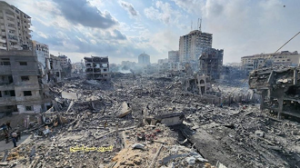 is a difficult one. We need to understand what lies behind it, as it is a daily confrontation between minds, souls and economic interests that fight each other on a daily basis.
is a difficult one. We need to understand what lies behind it, as it is a daily confrontation between minds, souls and economic interests that fight each other on a daily basis.
In essence, they are defending a “free society” or a “society liberated from capitalism” without analyzing the origins of these thoughts and models in depth.
They reflect the crisis of contemporary thought, which is not only philosophical, religious or political, but also a loss of the foundations of what is human, nature and science itself.
Sloterdijk’s vision, expressed in his spherology in volume I Bubbles, shows that both the onto and anthropological phenomena are more essential than the relationship between subject and object, because they precede the spatial experience of Being-in (even if it’s not exactly what Heideger called In-Sein), which is the main criticism of contemporary idealism.
In the field of religion (and this can be extended to thought), the essayist Byung-Chul Han reflects that the “pathos of action blocks access to religion. Action is not part of the religious experience. In On Religion, Scheleiermacher elevates intuition to the essence of religion and contrasts it with action.” (Han, 2023, p. 154) It is worth remembering that Scheleiermacher reintroduced hermeneutics as a method and influenced modern phenomenology.
Scheleiermacher said verbatim (quoted by Han in Vita Contemplativa) in On Religion: “Its essence is neither thinking nor acting, but intuition and feeling. It wants to intuit the universe, […] it wants to listen to it devoutly, it wants to apprehend it in its childlike passivity and be filled by its immediate influences” (apud Han, p. 154), and also affirms ‘all activity in an awe-inspiring intuition of the infinite’ and says Han: ”Whoever acts has a goal before his eyes and loses sight of the whole. And thinking directs its attention to only one object. Only intuition and feeling have access to the universe, namely the whole of being” (Han, 154, idem).
This disregard for the whole being, taking only its particular social aspects, such as economic, ethnic or even religious aspects, is what Heidegger called the forgetting of Being, even though the Greeks worked on ontological aspects.
However, there are two convictions and different visions of idealism, or state idealism in two proposals, capitalism and socialism, not forgetting that Marx is also a Hegelian, although his group has been named “new Hegelians”.
And the crisis of democracy is a crisis of the state, a model that has been corrupted by megalopaths and dictators who know little or nothing about the interests and lives of ordinary people.
The current war is the crisis of this model, both willing to prove their superiority by imposing war, as the uruguyan writer Eduardo Galeano said: “No war has the honesty to confess, I kill to steal” and even more obviously they kill innocent civilians.
The crisis of thought and war
The scenario of the world’s involvement in wars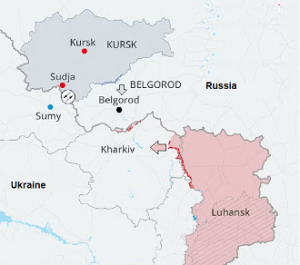 is a difficult one. It is necessary to understand what lies behind it, as it is a daily confrontation between minds, souls and economic interests.
is a difficult one. It is necessary to understand what lies behind it, as it is a daily confrontation between minds, souls and economic interests.
They reflect the crisis of contemporary thought, which is not only philosophical, religious or political, but also a loss of the foundations of what is human, nature and science itself.
Sloterdijk’s vision, expressed in his spherology in volume I Bubbles, shows that both the onto and anthropological phenomena are more essential than the relationship between subject and object, as they precede the spatial experience of Being-in (even if it’s not exactly what Heideger called In-Sein), which is the main criticism of contemporary idealism.
In the field of religion (and this can be extended to thought), the essayist Byung-Chul Han reflects that the “pathos of action blocks access to religion. Action is not part of the religious experience.” (Vita Contemplativa by Byung Chul Han, p. 154), so religion is also in a daily “war” that takes military warfare to the extreme.
The hatred that has reached Iran and its allied groups and Israel is linked to this idea, and also fundamentalism, which is different from orthodoxy, leads to the extremes of war.
While orthodoxy proclaims love and attachment to others, action leads to war and the destruction of what is different, nothing is tolerated that is not similar to the “model” of the ideal or the ideology that derived from it, dictatorships and oppressors proliferate across the planet.
The preparation of Iran and Israel for a total war without intermediaries, and of NATO with Russia, are getting closer and closer. Of course, common sense is always possible and knowing that everyone will lose, but the logic of war is that someone will always lose more, and that constitutes victory.
Russia’s approach to Kharkiv and Ukraine’s entry into Russian territory show that the war is one of conquest and thus reduces the possibility of a peace agreement.
Hope is always possible, and it is the resilience of the spirit and the desire for peace.
Wars and their crimes intensify
Both in Eastern Europe and the Middle East,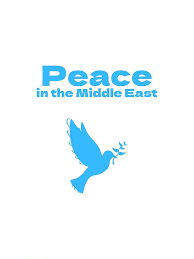 violence against civilians increases and the war increasingly takes on global proportions with the presence of US and European forces.
violence against civilians increases and the war increasingly takes on global proportions with the presence of US and European forces.
Ukraine’s advance on Russia is met with multiple bombers of civilian regions by Russia, while Ukraine advances into Russian territory and tries to consolidate itself within this territory, suffering setbacks in the east where Russian forces approach Kharkiv.
On the border of Lebanon and the West Bank, Israel and Hezbollah exchange fire with rockets, Prime Minister Benjamin Netanyahu was convicted by the prosecutor of the International Criminal Court for crimes against humanity and war crimes in Gaza, Hamas on the other hand killed 6 hostages, four men and two women who were at the music festival, the scene of terrorism carried out by Hamas in Israeli territory.
The climate is one of total war, Israel has declared itself “at war”, there is an evacuation of civilians in Gaza, and several airlines have canceled flights to Israel.
The situation is quite worrying because it is increasingly a path of no return, a total war is increasingly possible, the Russian foreign minister spoke openly about the matter, last Tuesday (27/08) he said that “the The West is playing with fire.”
The minister and spokesperson directly threatened the USA by stating: “Americans unequivocally associate conversations about the Third World War as something that – if, God forbid, it happens – will exclusively affect Europe”, so he assumes that the possibility exists.
Certainly the warning is clear, and the situation of Ukrainian troops in an area of 1,200 km2 within Russia is not only a nuisance, but shows, at least occasionally, a military fragility of which Russia has always been proud, the country has never abandoned education warfare, which is even taught in state schools.
The world’s concern is the tension in the Middle East, unfortunately there is no prospect of disarmament and both Netanyahu’s conviction and the death of hostages by Hamas are fuel on the fire that fuels hatred and war. September, which begins, brings global concerns.
On the Eastern European side, it is possible to sew some truce and a path to peace, if Europe and NATO want, of course, and Russia admits the negotiation, with the recent defeats and the concern for its territory this can happen, but the involvement of several countries is very worrying, a clear sign of respect for Russian sovereignty is needed.
Peace must be desired and practiced by everyone, it is necessary to disarm spirits, the global climate is tense.
An un-avoidable war
The escalation of the war continues without a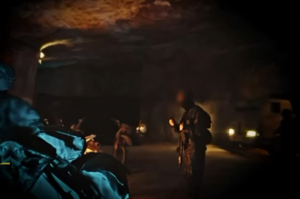 light at the end of the tunnel, despite efforts to ensure that the two most dangerous wars do not exceed limits that make 3G inevitable, on the Iran and Israel side of the conflict there were unsuccessful conferences in Doha, on the Ukraine side x Russia, India’s Prime Minister Narendra Modi visited Zelensky in Kiev.
light at the end of the tunnel, despite efforts to ensure that the two most dangerous wars do not exceed limits that make 3G inevitable, on the Iran and Israel side of the conflict there were unsuccessful conferences in Doha, on the Ukraine side x Russia, India’s Prime Minister Narendra Modi visited Zelensky in Kiev.
Symbolically, both events are important for Peace, Mahatma Gandhi’s India has a pacifist tradition, Narendra Modi 14th. Prime Minister of India, he is the first to have been born after independence from England, achieved in a peaceful war on the Indian side, as England acted with repression and violence.
The conference in Doha also has its significance, in addition to several conferences from Western countries, it also hosted the 5th. conference for Least Developed Countries (LDCs) that seeks to respond to the challenges of achieving the Sustainable Development Goals through a program of Action (Doha Program of Action – DpoA).
The military incursion into Russia continued in a significant area of 1,200 km and there were also drone attacks, the objective is to reach military posts and oil reservoirs on Russian soil, but Russia is advancing on eastern Ukraine in areas close to Kharkiv and Belarus also concentrates troops in other side, Ukraine acuse.
The escalation of both wars, there is a video showing tunnels inside Lebanon of the pro-Iran Hezbollah group. With enormous mobility where motorcycles and trucks pass, where a large part of the weapons for attacks would be located, which in the early hours of yesterday (Sunday 25/08) would have already started, Israel is on high alert and is removing residents from the border.
Lithuania announced that it already has collaboration areas with the German army for exercises in case the war with Russia escalates, the initial forecast is to place 5 thousand soldiers in areas already reserved for the German army.
Biden announced new military aid to Ukraine, the conversation between US Secretary of Defense Lloyd Austin with his Ukrainian counterpart Rustem Umerov on Friday (23/08) talks about a package worth US$ 125 million, in reais around R $685 million.
India’s involvement and the countries that meet in Doha (among them the United States and Egypt) is possíble, but is necessary first desarm the spirits.
The limits of total war
With hope and with great fear of a total war, which would culminate in a great civilizational crisis, we post weekly analysis of the evolution of situations in which the limits of a total war can be broken and lead to an inevitable confrontation.
which would culminate in a great civilizational crisis, we post weekly analysis of the evolution of situations in which the limits of a total war can be broken and lead to an inevitable confrontation.
Now countries in Europe and the United States are trying to understand these limits, recognizing that Israel exceeded this limit by assassinating the leader of Hamas in the middle of Iranian territory, the idea of putting an end to the tension created runs the risk of not being heard by Iran and a war Direct agreement between Israel and Iran would involve the world’s great war powers.
The situation in Ukraine is similar, although in the opposite direction, the country was severely attacked and punished in these two years of war on the way to the destruction of its energy sources, now it has organized a bold retaliation by invading a Russian border zone and establishing itself in an area of around a thousand kilometers, in the Kursk region of Russia (photo region of bridge destroyed).
Yesterday, Sunday 18/08, Volodimir Zelenski spoke for the first time that the objective is to create a “buffer zone” to prevent attacks in the region of the country’s second largest city, Kharkiv, however this advance infuriated the Soviet leaders, who accuse the West to prepare and help Ukraine in the invasion, this limit was also exceeded there.
The sending of a submarine capable of firing missiles to the Middle East, according to White House spokesman John Kirby, who stated that the situation in the region was discussed with France, Germany, Italy and the United Kingdom.
On the other hand, an influential Russian deputy, Mikhail Sheremet, said on Friday that the presence of a military arsenal on Russian soil is “irrefutable evidence of foreign participation” in Ukrainian military action.
All of this is a pre-World War scenario, there is no longer a limit between Western involvement and these two outbreaks of war, there is always hope, the men who provoke wars can regain their serenity and understand that these limits should not be exceeded and go to a negotiation table, but tension escalated to maximum level.
Unity or dualism
Dualism is an essential part of modern thought, even if little or nothing is known about philosophy, and it has penetrated deeply into the human soul and created things through contrasts, not the one that came from Plato, the shadows of the cave where we cannot see clearly and not the clearing place of Heidegger’s search to find the forgotten being in philosophy.
even if little or nothing is known about philosophy, and it has penetrated deeply into the human soul and created things through contrasts, not the one that came from Plato, the shadows of the cave where we cannot see clearly and not the clearing place of Heidegger’s search to find the forgotten being in philosophy.
Byung-Chul Han, when describing modern narratives, is incisive: “the new barbarian celebrates the poverty of experience: one should not imagine that men aspire to new experiences. No, they aspire to free themselves from all experience, they aspire to a world in which they can display their external and internal poverty so purely and so clearly that something decent can result from it” (Han, 2023, p. 35) quoting Walter Benjamin .
He will then say that they “profess transparency and a lack of mystery, that is, they profess a lack of aura. They also reject traditional humanism” (pgs. 35-36), clarifies, however, that the aforementioned book by Walter Benjamin “is full of ambivalence” and in the end, after a “certain” apology, modernity (the quotation marks are mine) gives way disillusionment and foreshadows the Second World War.
We could have freed ourselves from this “disease of modernity” (as Freud wrote) but Benjamin’s skepticism makes sense again, quoted in Han: “We became poor. We abandoned all the pieces of human heritage one after another, we had to pawn them many times for a hundredth of their value to receive in exchange the small coin of “current”…” (pgs. 37-38).
We talk about peace while we fight wars, we talk about unity and we are deeply divided, we talk about democracy and we come out in support of autocratic attitude and government, and perhaps the greatest of all sophistry, we intend to eliminate poverty and misery by filling our pockets, there is no coherence between discourse and attitude, it is about creating good narratives, and this started from the division between what is specific to the subject (not subjectivity but his soul) and the object (not objectivity, but the material use of what he produces life).
There is a lack of an “aura”, complains Byung-Chul Han, perhaps a spiritual one, the resistance of Edgar Morin’s spirit makes sense, but it is necessary to find a true meaning for this, what most men call religion is nothing other than justifying personal narratives.
It is possible to rediscover unity, dialogue and peace, but it is necessary to “disarm” the spirits.
Han, B.C. (2023). A crise da narração. Brazil, Petrópolis: Ed. Vozes.
Innocence, purity and peace
It seems contradictory and even innocent, in a way it is, but in a world so troubled with so many urgent problems, talking about peace, purity of feelings and behaviors is not only naive for those who believe in violent solutions, they are proving insufficient.
in a way it is, but in a world so troubled with so many urgent problems, talking about peace, purity of feelings and behaviors is not only naive for those who believe in violent solutions, they are proving insufficient.
If we prepare for war we are convinced that it and only it is the solution, however, they produce more injustices, more inequalities and only dictators and powerful people benefit from them, they are not bothered by financial crises, innocent deaths because In your mind, only your personal safety and well-being matters.
Also authors of great works, such as Edgar Morin, who talks about the resistance of the spirit, the limitation of a tragedy of great proportions feeds sick minds in all spheres, they believe that this could be a “sign of the future”, but it is the sign of a past, also on the threshold of the First and Second World Wars, many authors warned of this, such as Karl Kraus.
The purity of children should be observed more closely, they may even fight, but soon they want to make new friends so they can play with their friends, they don’t take everything to heart and fire, unless they are encouraged by adults, and there are those who do this unfortunately.
They want the common good, wishing everyone well and wanting a more equal and peaceful world is not just any thought, it is at the foundation of every civilization that bears this name, the warlike nations and empires disappeared after a tragic decadence.
In ancient times, the Greeks spoke of the Highest Good, aretê (virtue) and the education of the citizen, the ultimate objective of both Plato and Aristotle, it was still a society of slaves and where children and women had few rights, but this goal already existed.
Desiring peace, being inspired by the purity and joy of children’s coexistence, can take us away from the perverse thoughts that surround our daily lives, from divisions, hatred and grudges.


